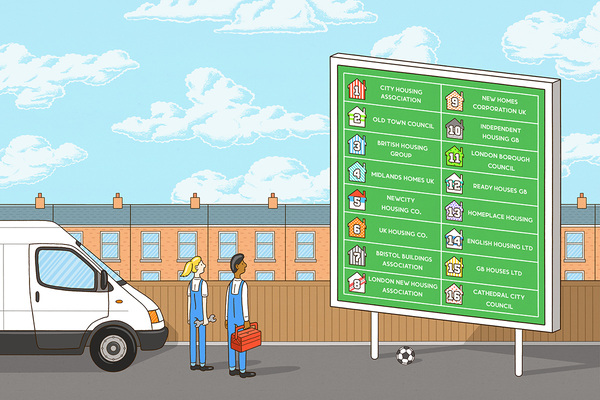You are viewing 1 of your 1 free articles
How are social landlords doing at responding to complaints?
The Housing Ombudsman recently published annual performance reports for social landlords in England for the first time. Nathaniel Barker finds out what these reports can – and cannot – teach us. Illustration by Rupert Gruber
It is a simple fact that however good your repairs service is, sometimes things will go wrong. For a large enough landlord, even a 99% satisfaction rate will mean a substantial volume of complaints that must be addressed.
But how good is the sector at addressing them? It is a tricky question, but one that has recently become a little easier to answer. Shortly before Christmas, the Housing Ombudsman published annual performance reports for social landlords in England for the first time.
Described by the ombudsman as part of its commitment to “openness and transparency”, the reports are intended to give residents more insight into how their landlord is doing and help drive up quality across the sector. Inside Housing has spent hours poring over the performance reports for hundreds of social landlords to find out what they can tell us – as well as what they cannot.
We’ll start with the basics. The performance reports present various bits of data on the ombudsman’s engagement with the landlord, such as the overall number of complaints received, the outcomes of any investigations into these complaints, the timeliness of the landlord’s compliance with any orders made by the ombudsman following investigations, and the types of orders made. There are also some comparative bits of data, where figures for the individual landlord are shown alongside the averages for the wider sector.
It is important to remember that these reports are not like regulatory judgements – they do not include any grading or narrative discussion based on the ombudsman’s assessment of performance. Instead, they are automatically generated spreadsheets for every member of the ombudsman scheme and simply set out the data it holds.
There are some teething problems with this data as a scrutiny tool. Landlords with multiple subsidiaries have multiple reports, making comparison tricky.
The ombudsman’s guidance says it intends to “enhance this aspect of our reporting next year”, and Housing Ombudsman head Richard Blakeway tells Inside Housing that “this is definitely an area of the reports we want to develop”.
There are some other aspects that need ironing out. Some landlords have now merged, but are still reported as separate organisations. Stock size figures also need some work: they date from 2018 and for most councils appear not to include leasehold units.
“We’re going through an exercise as an organisation of opening up our data, so that means there’s much more engagement with it and I think absolutely we need to be continuously explaining what we think our information means and to help people to understand it,” Mr Blakeway says.
But these are simple enough matters to resolve. The bigger question is: what does the data tell us?
Landlord performance reports data: 50 largest social landlords
| Provider | Number | Index score | Homes owned/managed | Total determinations | Maladministration rate | Compliance in three months | Compliance in six months | Orders 2019/20 | Compensation amount |
| A2Dominion | 2032 | 1.985201227 | 33,106 | 39 | 77% | 97.60% | 98.80% | 61 | £15,454.26 |
| Abri Group | 1999 | 0.062855527 | 23,035 | 4 | 25% | 100% | 100% | 2 | £1,850 |
| Anchor Hanover Group | 2446 | 0.251757461 | 30,617 | 23 | 9% | 100% | 100% | 6 | £550 |
| Aster Group | 2113 | 0.19668262 | 31,982 | 5 | 20% | 100% | 100% | 1 | £1,015 |
| Birmingham City Council | 36437 | 0.757472466 | 61,431 | 49 | 49% | 100% | 100% | 46 | £4,450 |
| Bristol City Council | 36069 | 0.35133331 | 27,095 | 9 | 22% | 100% | 100% | 5 | £250 |
| Bromford Housing Group | 36044 | 0.117566837 | 27,370 | 6 | 17% | 100% | 100% | 6 | £5,062.67 |
| Camden Council | 36117 | 1.209414829 | 23,173 | 31 | 65% | 93.80% | 93.80% | 47 | £15,435 |
| Catalyst Housing Group | 1578 | 0.748649176 | 30,315 | 30 | 37% | 97.40% | 97.40% | 21 | £4,625 |
| Citizen Housing Group | 2002 | 0.362677217 | 30,547 | 1 | 100% | 100% | 100% | 3 | £250 |
| Clarion Housing Group | 10758 | 1.073622185 | 120,457 | 104 | 51% | 96.50% | 99.40% | 130 | £32,634.09 |
| Flagship Housing Group | 36037 | 0.311837346 | 23,605 | 3 | 67% | 100% | 100% | 3 | £375 |
| ForHousing | 6392 | 0.275118301 | 23,360 | 2 | 50% | 100% | 100% | 1 | £100 |
| Gentoo Group | 2061 | n/a | 30,079 | 2 | 0% | ||||
| Guinness Partnership | 35980 | 1.073723769 | 65,246 | 27 | 30% | 100% | 100% | 18 | £7,662.75 |
| Home Group | 1882 | 1.002274392 | 51,709 | 32 | 50% | 100% | 100% | 29 | £6,968.99 |
| Hull City Council | 36244 | n/a | 24,193 | 4 | 0% | ||||
| Hyde Housing | 2204 | 1.177827989 | 48,018 | 30 | 43% | 92.70% | 94.50% | 32 | £7,544.62 |
| Islington Council | 36198 | 0.995782568 | 25,009 | 26 | 46% | 90% | 100% | 17 | £2,990 |
| Jigsaw Homes Group | 2530 | 0.362286025 | 33,136 | 7 | 0% | 100% | 100% | 1 | £482.97 |
| Karbon Homes | 93394 | 0.037420948 | 23,714 | 4 | 0% | 100% | 100% | 0 | £100 |
| Kirklees Council | 36246 | 0.085866392 | 22,581 | 1 | 0% | ||||
| L&Q | 2216 | 0.876808417 | 88,770 | 67 | 25% | 100% | 100% | 34 | £12,308 |
| Lambeth Council | 36248 | 1.529372957 | 24,179 | 31 | 58% | 90.20% | 98.40% | 47 | £10,542 |
| Leeds City Council | 36250 | 0.315402138 | 55,986 | 21 | 24% | 100% | 100% | 13 | £4,992 |
| LiveWest Homes | 10370 | 0.141602945 | 34,239 | 10 | 20% | 100% | 100% | 5 | £1,325 |
| Metropolitan Thames Valley Housing | 1551 | 0.635642191 | 52,111 | 26 | 35% | 100% | 100% | 13 | £8,261.68 |
| Midland Heart | 2160 | 0.489910897 | 32,376 | 16 | 25% | 90.90% | 100% | 6 | £890 |
| Newcastle City Council | 36274 | 0.118990957 | 25,698 | 1 | 0% | 100% | 100% | 0 | |
| Notting Hill Genesis | 10758 | 1.222534281 | 62,068 | 57 | 40% | 89% | 93.90% | 50 | £15,157.55 |
| Nottingham City Council | 46559 | n/a | 25,812 | 5 | 80% | 100% | 100% | 7 | £1,100 |
| Optivo | 10183 | 0.57138939 | 44,337 | 29 | 48% | 96.90% | 96.90% | 25 | £3,917.58 |
| Orbit Group | 1974 | 1.029028167 | 46,257 | 29 | 48% | 89.10% | 95.70% | 33 | £12,044.08 |
| Paragon Asra Housing | 93396 | 1.307720058 | 22,829 | 26 | 54% | 100% | 100% | 18 | £11,466.96 |
| Peabody Trust | 107573 | 1.207750919 | 64,579 | 60 | 35% | 97.40% | 100% | 34 | £18,639.24 |
| Places for People Group | 1561 | 0.361068184 | 50,196 | 7 | 14% | 100% | 100% | 2 | £650 |
| Platform Housing Group | 50204 | 0.338661609 | 43,485 | 22 | 36% | 100% | 100% | 7 | £4,000 |
| Riverside Group | 36009 | 0.352906578 | 50,460 | 21 | 38% | 100% | 100% | 21 | £4,356.65 |
| Sanctuary Housing | 1486 | 0.47393972 | 78,425 | 50 | 28% | 100% | 100% | 30 | £16,623.15 |
| Sandwell Metropolitan Borough Council | 36385 | 0.402144772 | 28,771 | 14 | 29% | 100% | 100% | 3 | £350 |
| Sheffield City Council | 36408 | n/a | 39,559 | 11 | 27% | 100% | 100% | 7 | £1,440 |
| Southern Housing Group | 36028 | 0.835538226 | 29,078 | 30 | 37% | 100% | 100% | 26 | £8,376.26 |
| Southwark Council | 36376 | 1.363636364 | 38,489 | 47 | 47% | 94.60% | 100% | 38 | £10,377 |
| Sovereign Housing Association | 1928 | 0.122572624 | 55,786 | 3 | 33% | 100% | 100% | 1 | £200 |
| Thirteen Housing Group | 36224 | 0.178004569 | 33,707 | 7 | 14% | 100% | 100% | 1 | £150 |
| Together Housing | 1993 | 0.239151808 | 38,138 | 6 | 50% | 100% | 100% | 8 | £7,300 |
| Torus | 11563 | 0.233778378 | 38,428 | 1 | 100% | 100% | 100% | 1 | £50 |
| Vivid | 93397 | 0.198091716 | 29,964 | 12 | 8% | 100% | 100% | 3 | £890 |
| Wakefield and District Housing | 2136 | 0.031814711 | 31,730 | 4 | 0% | 100% | 100% | 1 | £25 |
| Your Housing Group | 2012 | 0.50461361 | 25,994 | 9 | 22% | 100% | 100% | 13 | £1,943.59 |
Source: Housing Ombudsman, landlord performance reports
Note: In the interest of transparency, the second column shows the ombudsman member code on the report we have used for each landlord. We have also included a column showing the landlord’s score from our complaints failures index published in October. Only the 50 largest providers have been included
Each report includes tables showing enquiries and complaints referred to the ombudsman concerning the landlord in each of the three years shown, broken down into categories.
It is important to remember that these complaints are likely to be closed without a formal investigation by the ombudsman – if they are resolved before that point, for example, or simply do not fall within its scope. The landlords themselves may not even yet know about the issues involved in some of these cases.
It is difficult to take much of a view on whether the numbers involved here indicate good or bad performance. There are no benchmarking figures and it could be that some landlords with higher complaints and enquiries numbers are just better at making their residents aware of the ombudsman.
More interesting is to note where individual landlords have seen big changes in these numbers over the three-year period covered in each report.
Onward Homes saw a jump in enquiries and complaints to the ombudsman in that time, from 35 and 39 in 2017/18 and 2018/19 respectively, to 141 in 2019/20. The category with the biggest growth was ‘property condition’ – the ombudsman’s umbrella term for repairs and maintenance issues (Onward says the rise is largely down to an amalgamation of the business from five organisations into one over that period, as well as “initial difficulties” following a change in repairs contracts, which it says have since improved).
For the ombudsman, the category of complaints is as important as their overall number. This is how it identifies trends across the sector or potential issues with part of a landlord’s operations.
Each report includes this data in the form of a pie chart. We can see that ‘property condition’ is by far the biggest category of complaints across the sector (see above). There are one or two landlords that are particularly interesting. For example, Origin Housing’s shows that 59% of complaints fall under ‘property condition’, while conversely for Kingston Council the figure is just 25%.
Complaints and enquiries about One Housing are much more likely to fall under the ‘estate management’ and ‘landlord advice’ categories than average. Without doubt there is a story behind all of these outliers.
Origin says it has since brought in new technical staff to help improve its repairs service, as well as working more closely with its contractors. Kingston suggests its low proportion of ‘property condition’ complaints may be thanks to its ‘Better Homes’ capital programme. One Housing explains that its ‘landlord advice’ complaints may be driven by “some challenging complaint case work” on issues including cladding and fire safety. It says a refresh of its grounds maintenance work in 2019 has seen a reduction in complaints related to estate management.
It is a similar story with the charts showing the percentage of complaints closed without an investigation by the ombudsman. For some it is far lower – such as York City Council (33%) and St Albans Council (47%). Without commenting on these landlords specifically, Mr Blakeway observes that “typically” residents are getting in touch with the ombudsman “because they want to progress their complaint and they’re struggling to get a response from the landlord”. This percentage, therefore, might be seen as an indication of how successfully landlords are progressing complaints once they arrive.
The 11 social landlords with the highest maladministration rate
| Provider | Homes owned/managed | Total determinations | Maladministration rate |
| Redbridge Council | 4,445 | 7 | 86% |
| Shepherds Bush Housing Group | 4,621 | 12 | 83% |
| Gateway Housing Association | 2,916 | 5 | 80% |
| A2Dominion | 33,106 | 39 | 77% |
| Nottingham City Council/Nottingham City Homes* | 25,812 | 6 | 67% |
| Camden Council | 23,173 | 31 | 65% |
| Newlon Housing Trust | 7,551 | 11 | 64% |
| Hillingdon Council | 9,925 | 8 | 63% |
| Hammersmith & Fulham Council | 12,227 | 33 | 61% |
| EMH Group | 17,446 | 10 | 60% |
| Stonewater* | 33,880 | 20 | 60% |
Source: Housing Ombudsman, landlord performance reports
Note: *Groups/ALMOs have been consolidated
It is here that we get down to the more substantive parts of the report. Above is a table showing the landlords that were issued with at least five determinations in 2019/20 with the highest proportion resulting in a finding of full or partial maladministration – also known as the uphold rate.
Clearly, being on this list is something landlords would want to avoid. The ombudsman has used this metric before when identifying landlords it frequently finds at fault, in a September report on leaseholder cases. Mr Blakeway now remarks that the maladministration rate should be “as low as possible”.
Importantly, he extends this thought to make a point about comparisons in general: “Providing the benchmarking is, I think, valuable, but ultimately averages are not something to aim for. You want to be driving down the average maladministration rate; it’s not a kind of target.”
And now to perhaps the most interesting aspect of the performance reports. After upholding a complaint against a landlord, the ombudsman will likely issue one or more orders, such as to pay compensation to the affected resident or to carry out a repair. These come with a target date to be completed.
Mr Blakeway agrees that this is a particularly important part of the reports. Whereas much of the data contained within them “is telling you something” but needs further investigation to uncover “the complete picture”, he says, compliance with orders is “giving you a pretty clear indicator of what’s happening there”.
The good news is that the averages for landlords quickly doing what the ombudsman told them to do are very high – as of course they should be. In fact, the vast majority of landlords had 100% compliance with order target dates within three months, with 197 of the 226 we counted hitting that mark. However, for the relatively few providers failing to comply in time on more than the exceptional occasion, there may be real concerns.
Below are tables showing the five with the lowest compliance rate within three months and within six months. Note that the number of orders may not appear to correspond with the compliance percentages because this column indicates when an order was made, not the target date – which could be in two different years.
A resident reading one of these performance reports may want to know exactly why their landlord is falling markedly behind the average when it comes to enacting ombudsman orders. We contacted each landlord included in the tables for comment. Manchester City Council did not respond, and neither did Newham Council.
Dacorum Borough Council says the data “relates to one element of one case”, where it paid compensation “immediately”. However, it was “unable to reach a resolution with the complainant on the final element of the order relating to claim for costs”, with the tenant deciding to take legal action.
Corby Borough Council says it has now implemented a new complaints procedure, training for customer service staff and a better customer satisfaction framework, meaning it is “now 100% compliant with these orders and… committed to remaining at such standards”.
Gateway has also changed procedures “to ensure compliance within target”, while Origin says: “In one case we are sorry not to have met the timescale set by the ombudsman and we have tightened up our processes to make sure that it doesn’t happen again.”
North Tyneside Council says it believes it has complied with all orders in time and was asking the ombudsman to investigate a case that “may have been wrongly recorded as a late compliance because there was a 12-month delay in having that confirmed by the ombudsman”.
St Albans Council declined to comment.
Finally, the reports provide a breakdown of the orders issued to each landlord in 2019/20 and the sum of compensation they were asked to pay out over the year, although there is no benchmarking data here to put these figures into context.
The compensation figures are useful if we scan across reports for different landlords, because they go furthest towards indicating the severity of failures uncovered by the ombudsman. For instance, Optivo and PA Housing were both hit with 14 compensation orders – but the former paid out only £3,917.58 in total, while the latter had to stump up £11,466.96. That is £279.83 per compensation order for Optivo compared to £819.07 for PA – indicating a major difference in the extent of the issues needing to be put right.
Mr Blakeway does point out that just “one case could have a significant impact” on these figures for the whole year. Indeed, PA Housing says more than half of its compensation paid related to repairs on just three homes. It says these cases were down to “historical problems” with repairs services for some of its London stock. A number of changes to repairs and complaints have since significantly improved these issues, it adds.
Together Housing forked out a hefty £7,300 for just four compensation orders, an average of £1,825. Sue Lewis, head of supported housing at Together, confirms that this figure is driven by a case in which Together was found to have withdrawn support services for 29 supported housing residents without properly consulting them.
Compliance timeliness: within three months
| Provider | Homes owned/managed | Orders in 2019/20 | Compliance in three months |
| Manchester City Council | 15,937 | 4 | 20.0% |
| Dacorum Borough Council | 10,104 | 6 | 42.9% |
| Newham Council | 15,706 | 10 | 66.7% |
| St Albans City and District Council | 4,877 | 2 | 71.4% |
| Corby Borough Council | 5,260 | 3 | 75.0% |
Source: Housing Ombudsman, landlord performance reports
Note: Longhurst Group as an entity has a figure of 73.3%, but the figure for the group as a whole is higher so it has not been included
The million-dollar question, then: what constitutes good performance on complaints?
On the face of it, there are some landlords that stand out. One example is Bedford-based BPHA, which owns around 16,000 homes. BPHA was not found at fault following any of the three investigations involving it in 2019/20, complied with orders within three months of all target dates falling in that year, and did not have to pay out a penny in compensation.
No complaints against Wandsworth Council were upheld after seven investigations. It also achieved 100% on order compliance timeliness and was recommended to pay just £100 in compensation – an impressive record for a London borough with around 100 tower blocks and thousands of leaseholders.
Christine Ashton, executive director of housing at EMH Group, says that the landlord “welcomes the transparency” of the performance reports, and that a formal review of its complaints handling last year has “improved processes”.
Manchester City Council may have topped the order compliance lists, but it was found at fault only once by the ombudsman in 2019/20 and had to pay just £200 in compensation. These case studies show not only why it is important to look at the data in the round, but also that the weight one attaches to different metrics really matters. At the moment that makes it more difficult for residents to make immediate direct comparisons.
Mr Blakeway’s own assessment is that the reports constitute “a really valuable health check” for landlords’ complaints handling, but he emphasises his openness to suggestions on how they could be strengthened.
The data has some way to go to be perfect. But greater transparency is surely something to be welcomed, and the ombudsman’s performance reports feel like a step in the right direction.
Compliance timeliness: within six months
| Provider | Homes owned/managed | Orders in 2019/20 | Compliance in six months |
| Manchester City Council | 15,937 | 4 | 80.0% |
| Newham Council | 15,706 | 10 | 80.0% |
| Gateway Housing Association | 2,916 | 4 | 85.7% |
| North Tyneside Council | 14,970 | 3 | 85.7% |
| Origin Housing | 6,527 | 12 | 86.7% |
Source: Housing Ombudsman, landlord performance reports
Full responses from social landlords mentioned in this article
Matt Campion, chief executive of Shepherds Bush Housing Group: “Customer satisfaction is one of our most important business priorities and we have set ourselves tough corporate objectives for improving this. We are making progress on this journey but recognise that sometimes our services have not been good enough and that residents have had cause for complaint. This is disappointing to us and, of course, to our residents. However, we welcome complaints. They help us to understand what we’ve got wrong and allow us to learn and improve our services for all customers.
“We have seen a substantial reduction in residents making complaints to the ombudsman, with five referrals having been made this year.
“Our resident scrutiny panel reviewed our complaints performance against the new ombudsman’s code and the results of this are published on our website. We were keen for this review to be resident rather than colleague led.
“We are committed to working with our residents and the Housing Ombudsman to ensure consistently high levels of service and full accountability and transparency where service failures arise. In the interests of this we are advertising the recruitment opportunity for the Ombudsman’s Resident Panel to our residents.”
Spokesperson for Gateway Housing: “During 2019, the Housing Ombudsman made five determinations resulting in four orders totalling £725 compensation. We’ve implemented changes to our procedures to ensure compliance within target, and also worked with resident groups and implemented their recommendations on complaints handling.”
Gary Blatcher, director of customer experience at A2Dominion: “We continually work to deliver the best service for our customers and have made major improvements since the period covered by this data. From April of this year, our performance has improved by 37% compared to the results of this analysis and we are targeting further improvements. We have proactively worked with the Housing Ombudsman, improving our internal processes and using insight to invest in enhanced training for our customer-facing staff. In this spirit, we are also working with the ombudsman on a pilot partnership programme to share and embed best practice to further improve our performance.”
Spokesperson for Camden Council: “We are committed to providing the best standard of living and safety for our residents and are working hard to make any necessary improvements to ensure our residents receive the highest quality service. This includes carrying out extensive customer service surveys on a monthly basis and establishing a new customer services team within our repairs team to address complaints more quickly, identify any trends and to ensure lessons are learned to improve performance going forward.”
Spokesperson for Newlon Housing Trust: “Although only a small number of complaints are referred to the ombudsman, we are working hard to reduce these. We are working closely with our residents to minimise the causes for complaints and to resolve those we receive at the first point of contact.”
Christine Ashton, executive director of housing at EMH: “EMH welcomes the transparency that the publication of this information by the Housing Ombudsman brings. We continue to review our approach together with our tenants and our board to bring about improvements. Last year, our Tenant Scrutiny Panel conducted a formal review of our complaints handling, resulting in greater clarity and improved processes. To add further context, in 2019/20 we received 545 formal complaints and 10 ombudsman determinations (which equates to 1.8%). We resolved 98% internally.”
David Lockerman, customer experience director at Stonewater: “We always aim to provide a great customer experience but know there are times we could do better, which is why customer feedback is really important to us.
“Where we are unable to resolve a complaint directly with a customer, we welcome working with the Housing Ombudsman to deliver a fair, impartial and independent resolution service.
“From the recent performance data published by the Housing Ombudsman we can see that the number of complaints reported to them by our customers is in line with similarly sized associations. But we recognise we’ve got it wrong too often and we’re working with our customers to improve this. The way our business is structured across different legal entities makes direct comparisons within the data difficult and this is something we’re looking at.
“We’re absolutely committed to our customer promise and ensuring the voice of our customers is at the heart of our services. We value the positive relationship we have with the Housing Ombudsman and share its commitment to openness and transparency.”
Spokesperson for Onward Homes: “During the period in question we underwent a significant amalgamation, bringing together five separate organisations to become Onward Homes. This resulted in the consolidation of the group’s Housing Ombudsmen enquiries, which we believe largely accounts for the sudden increase seen in the report.
“We also changed our repairs contracts during that time and did experience initial difficulties as a result. We have communicated openly with our customers throughout the situation and worked hard to ensure the service has improved since then.
“These positive actions are reflected in the significantly lower number of ombudsmen enquiries during recent months. Our customers’ satisfaction is our first priority and we will continue to look at ways to improve our services and communicate with them going forward.”
Spokesperson for Origin Housing: “We are working with residents and our Customer Services Committee to improve our services, and over the past three years this has led to a year-on-year reduction in the number of complaints referred to the ombudsman. In one case we are sorry not to have met the timescale set by the ombudsman and we have tightened up our processes to make sure that it doesn’t happen again. We have taken action to improve our repairs and maintenance service including bringing in additional technical skills and working more closely with our contractors, and we have recently reviewed our complaints processes and provided training to all complaint-handling staff.”
Spokesperson for Kingston Council: “Kingston Council has a track record of investing in council homes through a capital programme known locally as ‘Better Homes’. This may be a reason why complaints about property conditions are lower than peer local authorities. We also have exciting plans to redevelop the Cambridge Road Estate, through regeneration and this may contribute to the fewer complaints as residents living there know of the plans to improve their homes. Decants are taking place this year to enable the first phase of development.
“Generally, the council has plans in place to improve the housing service and drive up customer satisfaction with Kingston as landlord. We are starting with gathering tenants’ views about the council – we have a survey live on the ‘Have Your Say’ portal to ask for feedback and this will be our base point to check how we are performing. On the management of properties, we plan to continue the investment in residents’ homes through a stock condition survey – the results are due back soon and this data will help to shape future capital programmes and budgets.
“Importantly, Kingston listens to residents' views about services and has a strong relationship with neighbourhoods and community groups across the borough so that we are connected to the issues that are important to residents.”
Spokesperson for One Housing: “We recognise how important it is to get things right for our customers and are continuing to work hard to improve how we deal with complaints.
“The landlord advice category relates to when we have spoken to the Housing Ombudsman for general advice. We’ve had some challenging complaint case work and have engaged with the ombudsman to ensure we’re following best practice – for example, with cladding and fire safety complaints which is a relatively new area.
“We also undertook a comprehensive review in 2019 of our environmental services which included a complete refresh of our cleaning schedules and grounds maintenance. We have seen a reduction in associated complaints during the 2020/21 reporting period. Our repairs side of the business has been brought back in-house and we have updated our repairs and maintenance offer, and this should result in an improved service to our customers.”
Spokesperson for Dacorum Council: “We strive to work with our tenants to resolve complaints at the earliest stage, which is reflected by our very low number of determinations. When interpreting the data it should be noted that this relates to one element of one case, in which we were unable to completely comply with the ombudsman’s order.
“In this case, the defined figure of compensation outlined by the ombudsman was paid immediately, as were two further claims made by the complainant in relation to costs incurred. Despite a number of attempts, we were unable to reach a resolution with the complainant on the final element of the order relating to a claim for costs and they decided to address the issue through a legal route.
“The ombudsman accepted that the council had done everything to progress the order to a satisfactory conclusion and as the complainant had decided to pursue a legal claim the case was closed, hence our 100% compliance in six months.”
Spokesperson for Corby Borough Council: “During the period 2019/20, Corby Borough Council worked hard to become fully compliant with the Housing Ombudsman’s orders. Following the implementation of a new complaints procedure, extensive training for frontline staff in customer service and a more robust transactional customer satisfaction framework, we are now 100% compliant with these orders and are committed to remaining at such standards.”
Spokesperson for North Tyneside Council: “Our records show that we had six cases under review by the Housing Ombudsman in 2019/20 and that we complied with all of them within the six-month target. We feel that one case may have been wrongly recorded as a late compliance because there was a 12-month delay in having that confirmed by the ombudsman. We are working with the ombudsman to review these performance figures.”
Spokesperson for PA Housing: “When PA Housing was formed in 2017, we set out to address historical problems with the condition of a number of our homes in London, where repairs and maintenance services had not been what they should be for several years. More than half of all of the compensation PA Housing paid to residents in 2019/20 related to repairs work on just three of these homes.
“Since its creation, PA Housing has focused on improving service delivery for our customers in the capital; and in April 2019, we moved the management and delivery of our repairs service for our homes in London from the Midlands, where it had been based for a long time, to the South East.
“As well as providing a much more localised service, we've appointed a new contractor that is dedicated to improving the quality of repairs and service for our customers in London. As a result, customers' satisfaction with our contractor's work has risen from 52.7% in November 2018 to 92% in August 2020.
“PA Housing has already spent £63m improving its homes; fitting new kitchens, bathrooms, windows and doors; and replacing roofs and lifts in several large blocks of flats.
“We have recently overhauled the way complaints from our customers are handled in line with recommendations made by our resident scrutiny group after its in-depth look at this service.
“Across PA, we're moving away from using a traditional customer contact centre to more specialised hubs within our operational teams. This means colleagues who deal directly with our customers have greater expertise and are able to manage enquiries more effectively.
“Meanwhile, we've begun using new systems, which enable us to more easily review complaints and spot trends in customer feedback. We're able to react quickly, and make the improvements needed.”
Sue Lewis, head of supported housing for Together Housing: “The compensation paid in 2019/20 includes the ombudsman’s findings relating to one case which involved a number of residents in one scheme who were affected by the consultation process to end the support service, following the removal of the funding for the service. The amount includes the aggregated total paid to the residents affected.”
Sign up for the IH long read bulletin
Already have an account? Click here to manage your newsletters













